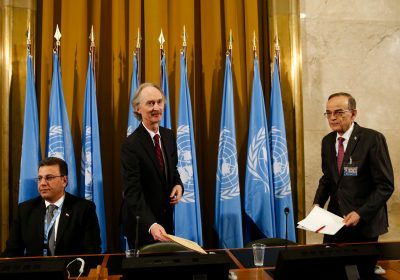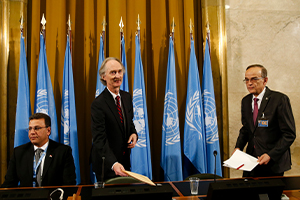
The Day After Association organized dialogue sessions between a group of representatives from local civil society organizations, activists, and local human rights activists, in five cities in northwestern Syria, to discuss the results of a study issued by TDA last November, entitled: “Syrians and the Constitution”.
This study had surveyed a group of Syrian men and women, inside and outside Syria, from various religious and ethnic backgrounds, about their positions on the Constitutional Committee, the extent to which they knew details of its work, and their views on the most prominent constitutional issues in Syria.
The sessions began with an analysis of participants’ interest in discussing a new constitution for Syria. It then proceeded to the prevailing perceptions among Syrians about constitutional endeavors, and raised questions about their expectations of the Constitutional Committee.
The sessions concluded with a presentation on participants’ views regarding the ongoing debate around constitutional issues, such as the political system, the form of the state, the role of religion, and basic rights and values in the next constitution. In addition, a set of conclusions and recommendations were drafted and addressed to the Constitutional Committee and the UN Special Envoy to Syria.
On the importance of these sessions and the impact they may have on beneficiaries, civil society activist Hamid Baaj, a participant in the dialogue sessions, said, “The largest segment of Syrians do not have sufficient knowledge of issues relating to political and legal affairs because of the Assad regime’s systematic approach of distancing them for fifty years. There is a need to organize such sessions to raise awareness on one hand, and on the other hand to exchange ideas and come up with a future vision that can help to understand the Syrian scene, with all its complexities.”
For her part, the Syrian lawyer Siba Serjawy, who also participated in the sessions, said, “The most important topics that the ‘Syrians and the Constitution’ survey addressed were issues related to women, as well as a new form of the constitution in line with the development of society, in order to serve its interests.”
In a related context, humanitarian and relief activist Nadia Al-Rajab said being alongside a number of Syrian women in such sessions is extremely important, especially since all of them have an interest in political issues, particularly those related to the constitution, as they have suffered a lot over the past few years under conditions of bombardment and displacement. She explained how the sessions allowed these women to actively participate in topics that they were not previously allowed to discuss freely and openly, especially since the drafting of the constitution represents an opportunity for them to consolidate their rights and combat discrimination and oppression against them.
Regarding Syrians’ aspirations for the work of the Constitutional Committee, former director of Public Relations in the Syrian Interim Government and lawyer Muhammad Salama confirmed there are no great expectations and hopes for the success of the Constitutional Committee in drafting a new constitution and reaching a solution for the Syrian conflict due to the regime’s reluctance to respond to any political process and deliberate obstruction of all political solutions over the past few years.
Salama stressed the need for the international community to commit to defending its resolutions, especially UN Security Council Resolutions 2118 and 2254, and the duty of international actors to shoulder their political and legal responsibilities and force the regime and Russia to abide by international resolutions, such as the formation of a transitional governing body with full executive powers, to maintain peace by drafting a new constitution, holding new elections, and fighting terrorism, etc.
